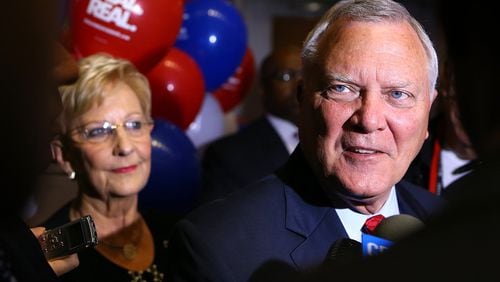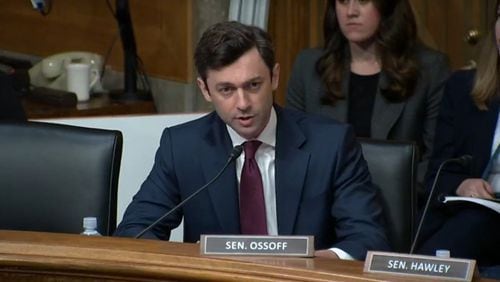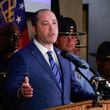If Georgians liked Gov. Nathan Deal’s first term in office, they’re probably going to love his second.
Deal saw his re-election Tuesday as a sign that Georgians support his nothing-flashy brand of conservative politics that promises progress on a few major fronts, low state taxes, a helping hand to businesses and little in the way of bells and whistles.
In his second term, he’s thinking big and somewhat geeky. He hopes to update the state’s 30-year-old school funding formula that educators have long felt short-changed Georgia students.
He wants to remake the state ethics commission, an agency that has for years been a political thorn in his side.
And he plans to continue his much-lauded criminal justice reforms started in his first term.
In other areas, such as the economy, Deal’s second-term strategy will look familiar: hard, behind-the-scenes work and financial incentives to attract new jobs in hopes of improving what’s now the worst unemployment rate in the country. A comprehensive review of the tax structure, he said, could also be on the table.
It will all be done in a fiscal environment that, with steady but slow tax growth, probably won’t allow for many splashy new programs or costly projects.
While his first term was spent trying to steady the finances of a state treated harshly by the Great Recession, the governor hopes the second will be about building on conditions that appeared to improve over the past year or so.
“I think (Georgians) will continue to see a steady hand of someone who will deal with the realistic problems of our state and try to move us forward,” Deal said the morning after his victory over Democratic state Sen. Jason Carter.
The governor — a former state lawmaker and congressman — said Tuesday’s election was his last time on the ballot.
Because of that, Deal won’t have to worry as much about the political ripple waves from his decisions, said John Watson, one-time chief of staff to Gov. Sonny Perdue. Still, Watson expects Deal’s second term to be similar to his first, at least in style.
“He is a methodical leader who wants to look at issues in a 360-degree way before taking a stand, and that won’t change,” Watson said.
A costly schools problem
Exit polling suggested jobs and the economy are the most important issue to voters, followed by education.
The governor pledged a stay-the-course message on the economy, and he is likely to continue backing the type of special tax breaks for firms and industries that have been approved by lawmakers for decades. He will also continue to promote business expansions and relocations that create jobs in Georgia, which he says send the message that the state is “on track.”
Education may be a trickier, and more costly, issue for the governor to work on.
Schools have faced austerity spending cuts for about a decade, forcing systems to reduce school days, furlough teachers and raise property taxes.
Deal put more than $300 million extra into this year's budget in hopes of softening the cuts and, in at least some districts, help pay for teacher raises. He will likely push to continue that funding in 2015, in part to show that it wasn't an election year gimmick.
But Deal has more ambitious plans. He wants to update the formula that determines how much Georgia schools receive from the state. The state spends more than $7 billion on k-12 schools, and the equation for determining who gets what — called the QBE formula — was developed in the 1980s.
Updating QBE is an unsexy endeavor likely paid attention to only by school superintendents, system finance directors and policy wonks, but Deal sees it as vital to the state's future. He has pledged to spend much of his political capital to get it done.
The formula has long been the bane of politicians and principals, who complain that the outdated calculus means some districts are getting the short-shrift while others benefit. Deal and his predecessor, Perdue, lamented that they were criticized for cutting education funding when they couldn’t keep pace with spending growth mandated by the formula.
“You can find somebody who doesn’t like something about the formula no matter where you are in Georgia,” Deal said in an extensive interview last week with The Atlanta Journal-Constitution. “And I’ve made my intentions known. I’m going to bring a broad spectrum of people who are knowledgeable about this issue together.”
Getting everyone — particularly educators — to agree on a new formula won’t be easy. While Deal doesn’t plan to run for office again, lawmakers face voters every two years, and they don’t want to get on the hit-list of teachers. His potential successors, Democrats and Republicans alike, will be closely watching the political winds as well.
Some educators are skeptical that anything positive will come out of the governor’s efforts. Past attempts to overhaul the formula have either failed or resulted in only minor revisions.
“We’ve seen this movie, and we don’t really like how it ends,” said Tim Callahan, longtime spokesman for the Professional Association of Georgia Educators, the state’s largest teacher group. “I hate to sound cynical, but we have a right to be skeptical.”
Part of Deal’s job will be to win over those skeptics.
“We need the buy-in from the education community and we intend to try to get that,” governor told reporters last week. “It will be a deliberative process over several years.”
The governor also told the AJC he will explore creating a statewide school district that could increase the number of charter schools, which are free from many state regulations. He wants lawmakers to study merit pay for teachers, a controversial notion that has been debated for decades. And he hopes to boost literacy rates before his term is up.
“We need to have a blueprint from the very beginning in the areas we concentrate on. One high priority is making sure children are reading at grade level by the end of third grade,” Deal said, echoing the words of Gov. Roy Barnes when he pushed school reform legislation in 2000-2002.
“We’ve all paid lip service to that and it’s not enough. I’m going to put the best minds at the table to solve this problem.”
An ethics overhaul
Fixing the state ethics commission may take less time.
During his first term, Deal had to defend himself against charges that his office interfered in an ethics investigation of his 2010 gubernatorial campaign.
He was slapped with complaints that claimed he improperly paid for the use of private aircraft and that questioned his use of campaign funds to pay legal fees. Commission members ultimately voted to dismiss the major complaints but ordered Deal to pay $3,350 in fees for technical defects.
Meanwhile, the commission has been plagued by litigation, accusations of dirty dealing and back-stabbing among staff. Three lawsuits and a threatened fourth have resulted in nearly $3 million in taxpayer dollars going to former employees in whistleblower cases, and more could still come. Ethics cases went unworked for more than a year.
Deal said the complaints against him were meritless, and he blamed an “inherently bad” ethics agency for the problems.
He wants to expand the agency with more resources and a new setup designed to have fewer potential conflicts of interest. He proposes replacing the five-member panel currently chosen by top elected officials with 12 appointees, four from each branch of the government, who would tap a 13th person as the group's chairman.
Deal has also suggested more narrowly defining who can file whistleblower complaints, citing a Georgia Supreme Court ruling that seemingly cleared the way for more lawsuits. He said he’s worried the ruling automatically granted state employees charged with conducting investigations “whistleblower” protections if they bring a lawsuit.
Taking the long view
A third major priority for Deal will be building on the success of the criminal justice changes he engineered during his first term.
The governor's criminal justice overhaul was a gradual three-pronged push to slash corrections costs by diverting more low-level offenders from state prisons.
It set up new “accountability” courts for drug abusers, those struggling with mental illness and military veterans aimed at giving them more intensive treatment rather than locking them up. Another phase sought similar changes in the juvenile justice system. And a third wave pumped more resources into the rehabilitation of recently released inmates.
Deal wants to give those changes more juice in his second term. He plans to scrutinize judicial circuits that send a disproportionate number of prisoners to state prisons. And he will press lawmakers to pour more money into expanding the network of accountability courts that require defendants to work, seek treatment and stay sober.
“We’ve planted the big seeds on criminal justice reform,” he told the AJC. “Now it’s a matter of funding and an expansion of accountability courts.”
Rep. Terry England, R-Auburn, chairman of the House budget committee, said Deal’s priorities fit his political personality: Take the long view and tackle prickly problems that may take years to fix.
“I don’t think he has any desire to be a U.S. Senator, I don’t think he has any desire to run for president,” England said. “So he can say, ‘Some of these things may not be popular, but I am going to do them because it’s the right thing to do.’”
Senate Minority Leader Steve Henson, D-Tucker, said there’s opportunity for Democrats and Republicans to work together on some of the governor’s priorities. But he made it clear that Democrats are wary of Deal’s education ambitions. Many Democrats, like many public school educators, oppose the wholesale expansion of charter schools.
“There’s definitely common ground on criminal justice reform and ethics,” he said. “It’s much more challenging on education issues. But we’re going to start with the posture that we’re willing to work together. And if we can’t, we’ll be the loyal opposition.”
About the Author








